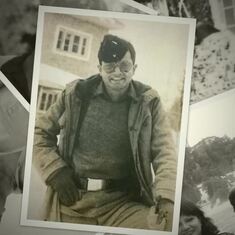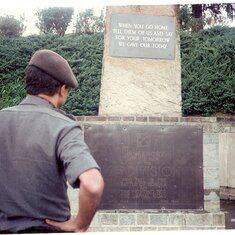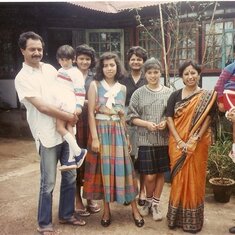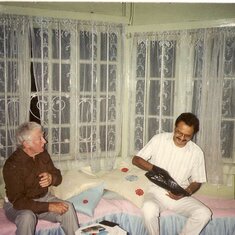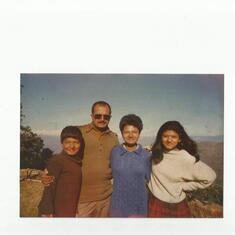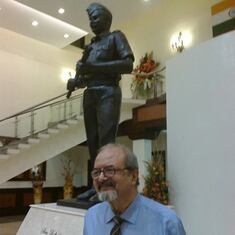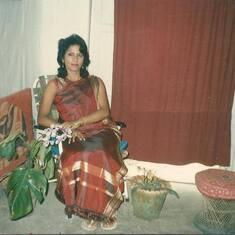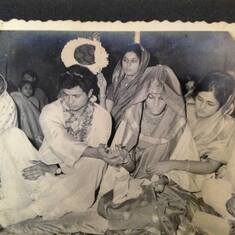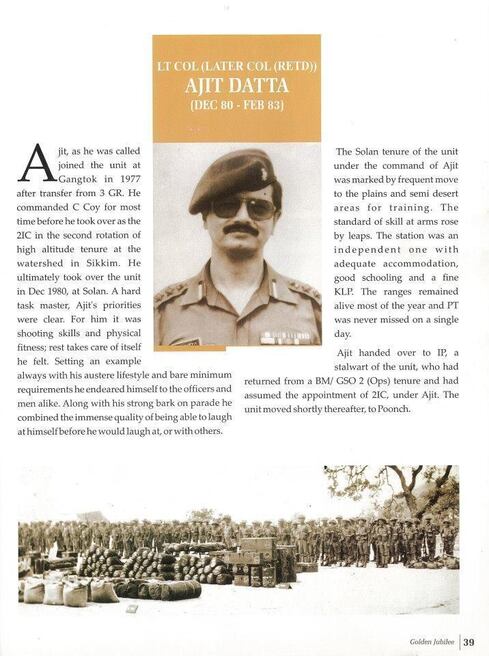May 5, 2021
May 5, 2021
Tagra Raho! - Vikramaditya Chaudhury
I would disagree with the trite catchphrase, “Old soldiers never die, they simply fade away.” The memories of their valour live on and are passed down the generations, thus making them immortal. However, while their deeds in battle are oft recanted and are remembered by all, their human side and warmth is a treasure that is cherished only by a lucky few. Once you have taken away the gun, stripped away the uniform and divested the human being of his rank and unit, you may be pleasantly surprised to encounter a childlike innocence, mischievous antics and an infectious sense of humour underneath the hard exterior.
Major Suren Dutta of Rilbong, Shillong was an impressive personality. He was as tall as he was dark. His wife, Labanyaprova was petite, pretty and extraordinarily fair of complexion. They truly were a striking couple and legend has it that they may have inspired the leading characters of Tagore’s Shesher Kobita, parts of which are rumoured to have been penned in the precincts of their home in Kench’s Trace.
Together they produced ten children, five sons and five daughters. While their Mother did her best to educate the daughters in matters pertaining to school and society, it was left to the good Major to discipline the brats. One fine day, he declared at breakfast that the boys would have to handle all the chores around the house. One of the first things on his list was cow management. The household boasted of a few magnificent Jersey bovines which were cared for by the trusted ‘Dajus’. Thus two of the most difficult brats, Nanu and Bulu, were placed under their tutelage. They had to learn all about the cows and their care.
For a few days all seemed to be going according to the well laid out plans of the Major. The boys woke up before sunrise and accompanied the bovine contingent and the Nepali cowherds to the pristine pastures of Shillong, returning later in the day for lunch. Only to set off immediately post lunch to bring the cows back home. They seemed to be learning a lot about cow management, though they remained rather evasive in their responses when they were questioned about their new found knowledge. Then one day, the Major returned home and asked his wife, “Have we employed any new Dajus? On my way back, I saw two young boys lying down by the roadside smoking beedis. They were chatting with our Gurung and Thapa. Must be their relatives?” He did not observe that Labanya had frozen in mid stride and continued, “In fact, one of them was very tall for a Daju, he was almost as tall as Nanu.” The penny had just dropped. That was the end of cow management.
This Nanu bloke was turning out to be quite a character! Towering above six feet and strikingly handsome, he was later regarded as the Don Juan of Shillong in his youth. While in primary school, we’ll just say that he didn’t excel in his academics. However, he boasted of an impressive lineage as his bad report cards were often returned to his Khasi class teacher, signed by Abraham Lincoln (his uncle), George Washington (another uncle) or Winston Churchill (yet another uncle). Matters came to a head one day and he was hauled to the Principal’s office with a report card that was signed by Queen Victoria (his maternal Aunt). The good Major was forced to intervene and sort his famous family out. Nanu, though bruised and battered, lived to fight another day.
The family home was a palatial and beautiful cottage on a hilltop. The entire hill was owned by the Dattas and it was dotted with several other smaller cottages, inhabited by distantly related family members. If the 12 member immediate family wasn’t big enough, the extended family had its tentacles spread far and wide from Lakhimpur to Jorhat to Guwahati to Calcutta. They numbered in the hundreds and the palatial cottage ‘Gopal Giri’ was forever inhabited by those who were near and not so near for short and not so short spans of time. Nanu was known to strip down to the pink, in the chill of Shillong, smear his body with talcum powder, and perch on a bough of a pear tree. As these unsuspecting temporary visitors happened to pass below, he would let out the most spine chilling shriek. Many of these relatives never visited again.
Yet another time, a newly married couple had come visiting and the Major had graciously allotted one of the several vacant cottages for them to reside in privacy. One moonless night, in a state of dishabille, the new bride screamed and howled all the way across the hilltop into the protective arms of Labanya. The bride recanted that she was about to change out of her Mekhela Chador when she saw a grotesque, distorted white face squashed against the window pane. It was a ghost AND a monster, she spluttered and swooned. As the commotion reached a crescendo and the entire family gathered, no one noticed that Nanu was missing. It was only the next day that one of the Datta girls, who loved to paint, noticed that her tube of white paint was missing.
Into young adulthood, Nanu excelled at cricket and was a fearsome pace bowler and he probably would have made a career out of it, however, fate had other plans. He also broke many hearts and many of his old flames, now in the twilight of their lives, still turn misty eyed at the mention of his name. In his early teens, he was kidnapped by some extremists. As the family panicked and the authorities swung into action, Nanu arrived home unscathed. He had beaten up two of his kidnappers and escaped!
Despite all this bravado and physical strength, he was also very kind hearted and forever ready to help those who needed it. He stood up for those who were not as fortunate as he was and many a bully was straightened out by Nanu. However, a disciplined Major and a free spirited maverick are unlikely comrades and it was thus decided that Nanu would be sent off to the National Defence Academy at Khadakwasla. Nanu needed to be disciplined!
Thus, another soldier was born unto the Datta family of Rilbong.
He excelled at the Academy and it was the proverbial duck and water relationship. Some of the wild unpredictability remained and he would often return home unannounced carrying nothing with him, not even a change of clothes. During his sojourn in Shillong, he would mend the fences, paint the walls, mow the lawn and putter around the house taking charge of chores and repairs before he was asked to. On a whim, he once trekked to Guwahati and back, resting for a few hours at some stranger’s hut at Nongpoh.
Much has been written in various articles of his valour, leading a contingent of the 1/9 Gorkha, at the Dera Baba Nanak Bridgehead in 1971 and I would rather acquaint you with Nanu the human being.
He was a dancer par excellence and I have had to reluctantly vacate the dance floor for him to jive with his favourite niece. I stood and watched in rapt admiration as he effortlessly jived to, “My heart goes Sha – La – La –La............” She remembers that he taught her how to dance to Perry Como, Neil Diamond and Lobo. She remembers going for long walks perched high on his shoulder. Up and down the hilly paths of Shillong giggling and gurgling with glee. She remembers laughing and laughing for no reason, except that he made her happy. For her, he was and will forever remain larger than life.
Post a botched heart surgery, he retired from the Army and was promptly appointed as the Chief Security Officer of a prominent bank which has branches all over India. He came back and straight facedly told Labanya, that he had been appointed as a security guard at a bank. He would be given a .303 rifle and a stool to sit on, at the entrance of the branch. It is another story that whiles on this assignment, post a bank heist in Mizoram; he raided a terrorist camp and recovered almost all the money that had been robbed.
Mischievous as always, he met up with a ‘young’ astrologer who solemnly examined his palm and told him, “You look like a man of uniform”. A ram rod straight gentleman, who was over 6ft 4inches tall, who had piercing eyes and the grip of a vice - you didn’t need a crystal ball to guess that he was a man of uniform! Nanu’s eyes lit up and he beamed, “You are a genius Sir! I have spent the last 40 years of my life working as a hotel waiter in uniform!” The astrologer was very pleased with himself.
She was beautiful and he was handsome. She was a college student and he was a Second Lieutenant. It was a match made in heaven. Whenever Nanu would visit Bhonti at her hostel, it is said that all the girls would line the balconies to see this stunning couple together. Soon the soldier and the beauty were married and they produced three wonderful children who I am privileged to count as family today.
I met him when I married his favourite niece and she was a bit apprehensive as to whether I would measure up to him. I didn’t. Five feet ten doesn’t stand a chance against Six feet four! Other than that, we got along famously. Military life for me was a dream and since I couldn’t / wasn’t allowed to achieve that, I had spent my life researching and learning about the history of wars and conflicts. My scant knowledge earned me his respect and his favourite lines (or were they my favourite lines?) for me were, “Arrey yaar! I keep forgetting that I am talking to a civilian. You are a true blue Fauji!”
We enjoyed some ‘Sharaab’ together. Many bottles were laid to rest over the years. He never called it “Daaru” or anything else, Sharaab was Sharaab and had to be given its due respect. Later, ill health took over and he gave up alcohol completely. One of the last jokes that he cracked was, “They are not letting me drink Sharaab any more, so I am having a lot of grapes. They will ferment and turn into wine!” Our favourite Army song was “Badlu Ram ka Badan” and we once belted it out together at 2 am, much to the displeasure of the unsporting neighbours who didn’t want to join in the chorus.
I met him for the first time in 1990, just after I married Lakhi. It was a winter afternoon and we had driven up to Shillong. Gopal Giri was bustling with family members and we were just about to be served lunch. Being a brand new son-in-law, albeit a vegetarian, it still promised to be a grand affair. I was introduced to him, he winked and beckoned me to follow him, I silently did so. Once out in the front lawn, he put his arms around me and sombrely said, “You are new to our family, so I thought that I would acquaint you with some of the rules that we follow at the dining table.” I was all ears. He continued with a very sad look on his face, “You see, prices have gone up. Everything is very expensive. All that we could use and throw; now we have to reuse. You know what I mean?” I didn’t, however, seeing his solemn expression I nodded silently. He exhaled gravely and whispered, “I have a small request for you. Please do eat all the food that is offered to you on the crockery, but please don’t eat the plates, bowls, cutlery and the glasses. Nowadays, we wash them and reuse them!” After a moment of deafening silence, he roared in laughter and a lifelong bond between the Colonel and the ‘Fauji’ was born that day.
He spoke atrocious Bangla and yet insisted on conversing with Lakhi in that distorted lingo, after all now she was a Bongali Daughter - in - law! My interactions with him were restricted to intricate discussions on war history and the memories of his Army days. I wish I had pestered him more and noted all that he had recanted. He included me in a WhatsApp group and I proudly found my name amongst the recipients of emails that were also addressed to erstwhile Brigadiers and Generals.
A few days before he took his battles elsewhere, he wished all of us, “Tagra Raho!” Those interested may Google it.
Unsung, undecorated, anonymous he left us on 21st. April 2021. However, he ensured that when his beloved Bhonti followed him just three days later, she was given a better farewell by the members of his erstwhile Regiment and other branches of the Army. Selfless till the very end.
Heaven is a much happier place now. God has Nanu by his side to make him laugh and Bhonti is right there beside them to keep him in check. She’ll ensure that they don’t belt out “Badlu Ram ka Badan” at 2am. In the unlikely event that they do, I will surely join them.
Tagra Raho Colonel Sahib, till we meet again.
Vikramaditya Chaudhury
I would disagree with the trite catchphrase, “Old soldiers never die, they simply fade away.” The memories of their valour live on and are passed down the generations, thus making them immortal. However, while their deeds in battle are oft recanted and are remembered by all, their human side and warmth is a treasure that is cherished only by a lucky few. Once you have taken away the gun, stripped away the uniform and divested the human being of his rank and unit, you may be pleasantly surprised to encounter a childlike innocence, mischievous antics and an infectious sense of humour underneath the hard exterior.
Major Suren Dutta of Rilbong, Shillong was an impressive personality. He was as tall as he was dark. His wife, Labanyaprova was petite, pretty and extraordinarily fair of complexion. They truly were a striking couple and legend has it that they may have inspired the leading characters of Tagore’s Shesher Kobita, parts of which are rumoured to have been penned in the precincts of their home in Kench’s Trace.
Together they produced ten children, five sons and five daughters. While their Mother did her best to educate the daughters in matters pertaining to school and society, it was left to the good Major to discipline the brats. One fine day, he declared at breakfast that the boys would have to handle all the chores around the house. One of the first things on his list was cow management. The household boasted of a few magnificent Jersey bovines which were cared for by the trusted ‘Dajus’. Thus two of the most difficult brats, Nanu and Bulu, were placed under their tutelage. They had to learn all about the cows and their care.
For a few days all seemed to be going according to the well laid out plans of the Major. The boys woke up before sunrise and accompanied the bovine contingent and the Nepali cowherds to the pristine pastures of Shillong, returning later in the day for lunch. Only to set off immediately post lunch to bring the cows back home. They seemed to be learning a lot about cow management, though they remained rather evasive in their responses when they were questioned about their new found knowledge. Then one day, the Major returned home and asked his wife, “Have we employed any new Dajus? On my way back, I saw two young boys lying down by the roadside smoking beedis. They were chatting with our Gurung and Thapa. Must be their relatives?” He did not observe that Labanya had frozen in mid stride and continued, “In fact, one of them was very tall for a Daju, he was almost as tall as Nanu.” The penny had just dropped. That was the end of cow management.
This Nanu bloke was turning out to be quite a character! Towering above six feet and strikingly handsome, he was later regarded as the Don Juan of Shillong in his youth. While in primary school, we’ll just say that he didn’t excel in his academics. However, he boasted of an impressive lineage as his bad report cards were often returned to his Khasi class teacher, signed by Abraham Lincoln (his uncle), George Washington (another uncle) or Winston Churchill (yet another uncle). Matters came to a head one day and he was hauled to the Principal’s office with a report card that was signed by Queen Victoria (his maternal Aunt). The good Major was forced to intervene and sort his famous family out. Nanu, though bruised and battered, lived to fight another day.
The family home was a palatial and beautiful cottage on a hilltop. The entire hill was owned by the Dattas and it was dotted with several other smaller cottages, inhabited by distantly related family members. If the 12 member immediate family wasn’t big enough, the extended family had its tentacles spread far and wide from Lakhimpur to Jorhat to Guwahati to Calcutta. They numbered in the hundreds and the palatial cottage ‘Gopal Giri’ was forever inhabited by those who were near and not so near for short and not so short spans of time. Nanu was known to strip down to the pink, in the chill of Shillong, smear his body with talcum powder, and perch on a bough of a pear tree. As these unsuspecting temporary visitors happened to pass below, he would let out the most spine chilling shriek. Many of these relatives never visited again.
Yet another time, a newly married couple had come visiting and the Major had graciously allotted one of the several vacant cottages for them to reside in privacy. One moonless night, in a state of dishabille, the new bride screamed and howled all the way across the hilltop into the protective arms of Labanya. The bride recanted that she was about to change out of her Mekhela Chador when she saw a grotesque, distorted white face squashed against the window pane. It was a ghost AND a monster, she spluttered and swooned. As the commotion reached a crescendo and the entire family gathered, no one noticed that Nanu was missing. It was only the next day that one of the Datta girls, who loved to paint, noticed that her tube of white paint was missing.
Into young adulthood, Nanu excelled at cricket and was a fearsome pace bowler and he probably would have made a career out of it, however, fate had other plans. He also broke many hearts and many of his old flames, now in the twilight of their lives, still turn misty eyed at the mention of his name. In his early teens, he was kidnapped by some extremists. As the family panicked and the authorities swung into action, Nanu arrived home unscathed. He had beaten up two of his kidnappers and escaped!
Despite all this bravado and physical strength, he was also very kind hearted and forever ready to help those who needed it. He stood up for those who were not as fortunate as he was and many a bully was straightened out by Nanu. However, a disciplined Major and a free spirited maverick are unlikely comrades and it was thus decided that Nanu would be sent off to the National Defence Academy at Khadakwasla. Nanu needed to be disciplined!
Thus, another soldier was born unto the Datta family of Rilbong.
He excelled at the Academy and it was the proverbial duck and water relationship. Some of the wild unpredictability remained and he would often return home unannounced carrying nothing with him, not even a change of clothes. During his sojourn in Shillong, he would mend the fences, paint the walls, mow the lawn and putter around the house taking charge of chores and repairs before he was asked to. On a whim, he once trekked to Guwahati and back, resting for a few hours at some stranger’s hut at Nongpoh.
Much has been written in various articles of his valour, leading a contingent of the 1/9 Gorkha, at the Dera Baba Nanak Bridgehead in 1971 and I would rather acquaint you with Nanu the human being.
He was a dancer par excellence and I have had to reluctantly vacate the dance floor for him to jive with his favourite niece. I stood and watched in rapt admiration as he effortlessly jived to, “My heart goes Sha – La – La –La............” She remembers that he taught her how to dance to Perry Como, Neil Diamond and Lobo. She remembers going for long walks perched high on his shoulder. Up and down the hilly paths of Shillong giggling and gurgling with glee. She remembers laughing and laughing for no reason, except that he made her happy. For her, he was and will forever remain larger than life.
Post a botched heart surgery, he retired from the Army and was promptly appointed as the Chief Security Officer of a prominent bank which has branches all over India. He came back and straight facedly told Labanya, that he had been appointed as a security guard at a bank. He would be given a .303 rifle and a stool to sit on, at the entrance of the branch. It is another story that whiles on this assignment, post a bank heist in Mizoram; he raided a terrorist camp and recovered almost all the money that had been robbed.
Mischievous as always, he met up with a ‘young’ astrologer who solemnly examined his palm and told him, “You look like a man of uniform”. A ram rod straight gentleman, who was over 6ft 4inches tall, who had piercing eyes and the grip of a vice - you didn’t need a crystal ball to guess that he was a man of uniform! Nanu’s eyes lit up and he beamed, “You are a genius Sir! I have spent the last 40 years of my life working as a hotel waiter in uniform!” The astrologer was very pleased with himself.
She was beautiful and he was handsome. She was a college student and he was a Second Lieutenant. It was a match made in heaven. Whenever Nanu would visit Bhonti at her hostel, it is said that all the girls would line the balconies to see this stunning couple together. Soon the soldier and the beauty were married and they produced three wonderful children who I am privileged to count as family today.
I met him when I married his favourite niece and she was a bit apprehensive as to whether I would measure up to him. I didn’t. Five feet ten doesn’t stand a chance against Six feet four! Other than that, we got along famously. Military life for me was a dream and since I couldn’t / wasn’t allowed to achieve that, I had spent my life researching and learning about the history of wars and conflicts. My scant knowledge earned me his respect and his favourite lines (or were they my favourite lines?) for me were, “Arrey yaar! I keep forgetting that I am talking to a civilian. You are a true blue Fauji!”
We enjoyed some ‘Sharaab’ together. Many bottles were laid to rest over the years. He never called it “Daaru” or anything else, Sharaab was Sharaab and had to be given its due respect. Later, ill health took over and he gave up alcohol completely. One of the last jokes that he cracked was, “They are not letting me drink Sharaab any more, so I am having a lot of grapes. They will ferment and turn into wine!” Our favourite Army song was “Badlu Ram ka Badan” and we once belted it out together at 2 am, much to the displeasure of the unsporting neighbours who didn’t want to join in the chorus.
I met him for the first time in 1990, just after I married Lakhi. It was a winter afternoon and we had driven up to Shillong. Gopal Giri was bustling with family members and we were just about to be served lunch. Being a brand new son-in-law, albeit a vegetarian, it still promised to be a grand affair. I was introduced to him, he winked and beckoned me to follow him, I silently did so. Once out in the front lawn, he put his arms around me and sombrely said, “You are new to our family, so I thought that I would acquaint you with some of the rules that we follow at the dining table.” I was all ears. He continued with a very sad look on his face, “You see, prices have gone up. Everything is very expensive. All that we could use and throw; now we have to reuse. You know what I mean?” I didn’t, however, seeing his solemn expression I nodded silently. He exhaled gravely and whispered, “I have a small request for you. Please do eat all the food that is offered to you on the crockery, but please don’t eat the plates, bowls, cutlery and the glasses. Nowadays, we wash them and reuse them!” After a moment of deafening silence, he roared in laughter and a lifelong bond between the Colonel and the ‘Fauji’ was born that day.
He spoke atrocious Bangla and yet insisted on conversing with Lakhi in that distorted lingo, after all now she was a Bongali Daughter - in - law! My interactions with him were restricted to intricate discussions on war history and the memories of his Army days. I wish I had pestered him more and noted all that he had recanted. He included me in a WhatsApp group and I proudly found my name amongst the recipients of emails that were also addressed to erstwhile Brigadiers and Generals.
A few days before he took his battles elsewhere, he wished all of us, “Tagra Raho!” Those interested may Google it.
Unsung, undecorated, anonymous he left us on 21st. April 2021. However, he ensured that when his beloved Bhonti followed him just three days later, she was given a better farewell by the members of his erstwhile Regiment and other branches of the Army. Selfless till the very end.
Heaven is a much happier place now. God has Nanu by his side to make him laugh and Bhonti is right there beside them to keep him in check. She’ll ensure that they don’t belt out “Badlu Ram ka Badan” at 2am. In the unlikely event that they do, I will surely join them.
Tagra Raho Colonel Sahib, till we meet again.
Vikramaditya Chaudhury


